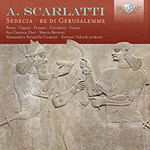|
Back
02/07/2019
Alessandro Scarlatti: Sedecia, Re di Gerusalemme
Amor Lilia Perez (Sedecia), Alessandra Capici (Anna), Rosita Frisani (Ismaele), Mario Cecchetti (Nadabbe), Marco Vinco (Nabucco), Ars Antica Choir, Marco Berrini (choir master), Alessandro Stradella Consort, Estévan Velardi (conductor)
Recorded at the Oratorio di S. Erasmo, Sori, Italy (July 1999) – 130’
2 CDs Brilliant Classics 95537 – Booklet in English only; no libretto

   
Here is an intriguing discovery: a vivid, compelling oratorio (or “spiritual melodrama”) performed in Rome in 1706 (although first performed in Urbino in 1705) when Alessandro Scarlatti (1660-1725) was at the mid-point of his prolific career which eventually produced 63 operas and many other works.
Sedecia is the biblical Zedekiah, King of Jerusalem. He was placed on the throne by the regional warlord, the Assyrian king, Nebuchadnezzar (Nabucco), but later attempted an alliance with Egypt, Assyria’s main enemy. This prompted the action recounted in the oratorio.
The first thirty minutes or so of the work serve to introduce us, one by one, to the five characters. Only then does the story come into focus. As a result of Sedecia’s treason, Nabucco and his forces are gathering to attack the city. Sedecia is certain of victory although his general, Nadabbe, questions his actions. Sedecia’s wife, Anna, is apprehensive but their young son, Ismaele, shares his father’s defiance. Nabucco vanquishes the army of Israelites and comes forward to confront Sedecia. Ismaele rushes forward to challenge the warrior king who, without hesitating, stabs him. Grief-stricken Anna leaves, vowing her own sorrowful death. Nabucco spares Sedecia’s life but blinds him and leads him in chains (along with Nadabbe) to prison in Babylon. Sedecia voices thanks for his blindness so he cannot see his own degradation. (It is not mentioned in the libretto, but this marked the start of the Babylonian captivity and the events recounted in Verdi’s Nabucco.)
This is a brutal story, like so many biblical tales. In Rome at that time, where opera (so secular, even frivolous) was forbidden, such musical works had to have a clear moral. As a quote in the booklet states: “(Sedecia’s) sinful and abominable actions receives the bloody punishment of heaven”, although Nabucco seems an unlikely instrument of the Judeo-Christian God. The quote is from the preface to the work which contains fulsome praise for its dedicatee, Cardinal Pietro Ottoboni. A more apt lesson would be “Don’t mess with your warlord!”
The recording dates from 1999 (has it ever been released before?) and it contains a satisfying degree of musical energy. One could wish for a greater degree of expressiveness from two of the singers, however. In the title role, alto Amor Lilia Perez seems so focused on handling the challenging vocal lines that she fails to establish Sedecia’s reckless stubbornness. Bass Marco Vinco nicely voices Nabucco but a degree of menace would be welcome. Soprano Alessandra Capici is just right as the justifiably fearful wife, Anna, and Rosita Frisani as the foolhardy young boy. Tenor Mario Cecchetti impresses as the faithful general, Nadabbe. Estévan Velardi brings forth maximum liveliness and colour from the orchestra and chorus.
This work gives an intriguing insight into the music of Scarlatti. It is of interest to note that Handel was in Rome around that time and this is where he wrote his first oratorios. He is known to have attended performances at Cardinal Ottoboni’s palace and one wonders if he was familiar with it.
The Brilliant Classics website has the libretto with English translation (but not side-by-side).
Michael Johnson
|